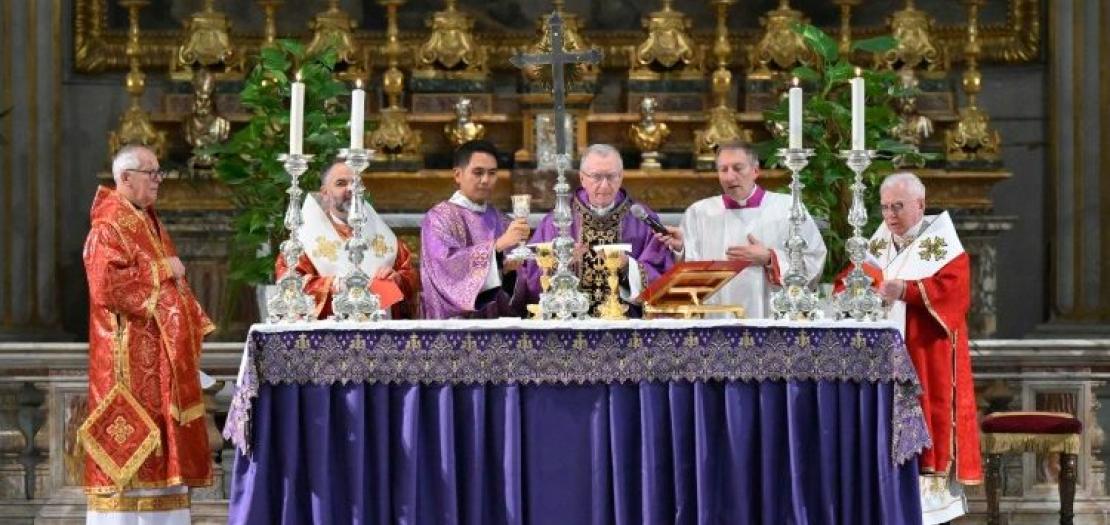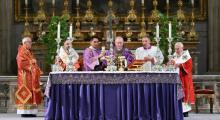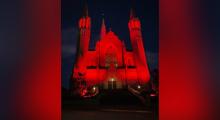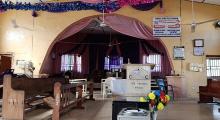Issued by the Catholic Center for Studies and Media - Jordan. Editor-in-chief Fr. Rif'at Bader - موقع أبونا abouna.org

In Ukraine, “There is no justification for forcing thousands of civilians to live in darkness and cold. We are deeply affected by the news of attacks on electrical systems in civilian structures, which have made life even more difficult for many people”.
With these words, Cardinal Secretary of State Pietro Parolin emphasized the suffering of the war-struck Ukrainian people during his homily at a Mass celebrated on Thursday, November 20, at the Church of Sant’Andrea della Valle in Rome.
Organized by the Ukrainian Embassy to the Holy See and the Sovereign Order of Malta, the liturgy was celebrated to remember the victims of the 1932-33 Holodomor, a famine perpetrated by the Soviet regime, after the Ukrainian population had protested against the collective property system, which caused millions of deaths.
“Every action that deprives the civilian population of the possibility of living in dignity is an offense against humanity and an outrage against God, who is light, life, and mercy. We cannot remain indifferent to those who suffer from hunger, uncertainty, war, winter cold, imprisonment, and exile,” the Cardinal said.
He recalled Pope Leo's words to journalists on Tuesday evening: “Unfortunately, every day - every day - people are dying. We must insist on peace, starting with this ceasefire, and then dialogue.”
The Ambassador's gratitude
The Ukrainian Ambassador to the Holy See, Andrii Yurash, thanked Cardinal Parolin and all those attending, including several Italian political representatives and over 50 ambassadors from among the approximately 80 missions based in Rome. Yurash highlighted especially the presence of a delegation of four Ukrainian teenagers between 14 and 18 years old who, at the beginning of the war, were taken to Russia and have now been returned to their families.
He also underlined the presence of three women, “heroes of the resistance and of dignity” that he said, showed “strength and an extraordinary determination”. At the end of the Mass, there was also the inauguration of the art exhibit “Prayer for Ukraine” and a concert with the performance of the Metropolitan String Quintet.
The Mass was also attended by the Deputy Head of the Office of the President of Ukraine, Iryna Vereshchuk.
The peace plan
After the Mass, responding to questions from the press, the Cardinal highlighted the topic of the war, commenting on the 28-point peace plan proposed by U.S. President Donald Trump. His hope, he said, is that “channels of dialogue will open up that will allow this tragedy to end.”
“It will be very difficult to find a compromise between the needs on one side and the demands on the other. So I imagine that the path to negotiation will be an uphill battle,” commented the Secretary of State.
In his view, “Europe should participate and make its voice heard, not remain excluded,” not least because “it has been actively involved” in Ukraine until now. As for the issue of territorial cession, “it is premature” to talk about it, also because it will be the result of negotiations.”
“Peace,” he said, “will only be achieved if both sides are somewhat satisfied with the compromise, because in the end a compromise will have to be made.”
The Holy See’s work
The Holy See, the cardinal added, remains committed to the exchange of prisoners and the return of Ukrainian children taken to Russia: “We continue to work in this area, and it seems to me that the mechanism regarding the children has now been renewed.”
“We are available to help in this area because we believe that, beyond caring for those who are suffering, it also creates conditions that will lead to peace,” he said.
The horror of the Holodomor
In his homily, Cardinal Parolin said the Holodomor was a “tragic famine” deliberately caused by “hatred, injustice, indifference, and abuse of power”. He remembered the victims as “sons and daughters beloved by God, our brothers and sisters whose suffering continues to challenge the conscience of the world.”
In this Jubilee Year, centered on the theme of Hope, the Secretary of State invoked God “to soften hardened hearts, to stop violent hands, to open paths of dialogue and peace.” He also said it is important to renew hope “for yesterday's victims, for today's sufferers, for a people who yearn for peace, freedom, and a peaceful future.”
“Today, together with the Ukrainian people marked by historical wounds and the tragedy of the ongoing war, we are called to persevere in prayer and to bear witness to a faith that endures, that hopes, that waits in silence, but as a force, for the Lord's salvation," he added.
He appealed for prayers for prisoners, for those who “bear the wounds of war in their bodies and spirit”, for the divided families and frightened children, and for the “hearts that have lost hope”.
“Today, before the altar of the Lord, we renew our faith in the God of life, entrusting to His eternal mercy all the victims of hunger, hatred, and violence," the cardinal concluded, "and we humbly and confidently implore that the dawn of peace, a just and lasting peace, may soon rise for Ukraine.”







